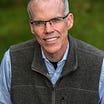Your Monthly Dose of Climate Hope: A Conversation with Bill McKibben (Recording)
The second Monthly Dose of Climate Hope live event took place on June 11, 2025! Sam Matey hosted an in-depth conversation with world-leading climate activist Bill McKibben. The YouTube recording is above, and below we embed and quote a selection from Bill McKibben’s many excellent recent Substack posts at The Crucial Years!
You can join SunDay at sunday.earth.
“The best reason to build lots of clean power is to slow catastrophic global heating, and the second best is to spare the 9 million humans who die each year from breathing the combustion byproducts of fossil fuel. (That’s one death in five). But the third best reason is because, by its nature, this is liberating energy, in sharp contrast to coal and gas and oil.
Indeed, fossil fuel has an inherent quality that we focus on too rarely: it’s only available in a few places around the world, where the biology of ancient times (all those plankton and ferns) piled up to create the deposits of coal and gas and oil on which we currently depend. In the real world, that means that the people who control those small and scattered deposits have way too much wealth and power—which they have used to dominate the rest of us….
By contrast, the sun is everywhere, a liberating force precisely because it can’t be hoarded or held in reserves. No one will ever fight a war over the sun….No one will ever be able to embargo it; decentralized power is a key part of the fight against the centralized power that Trump represents.”
—Bill McKibben, “On Democracy, Liberated Energy, and the Perfect Moment.”
“Ten thousand dollars for a “decent starter model.” We’re not talking junk: “a new Toyota electric-powered sport-utility vehicle for about $15,000, complete with sunroof and cup holders.” Some of this comes because Chinese automakers are paid less (enough, however, to afford a new car); some of it comes from increasingly roboticized factories; and some of it comes from government subsidy. Because the government has decided it wants to own the future: whose cars do you think are going to do better in, um, “foreign lands”?”
—Bill McKibben, “How They Do It in "Foreign Lands"“
“Carney comes into power when that equation has flipped: we now live on a planet where wind and sun provide energy more cheaply than gas and oil (and where the sane if brutal superpower, China, has clearly figured that out). That fact may give him room to move his country decisively in the right direction.”
— Bill McKibben, “The world--politely--tells Trump to take a hike”
“Here’s the thing: to our untrained eye, a corn field looks more “natural” than an array of solar panels. But a corn field is a biological desert—basically there are no pollinators there at all (corn is self-pollinating) because they are sprayed with pesticides and herbicides. Put up some solar panels, and add some plants that only need to be mowed once a year or so (sometimes with sheep) and you see an explosion of life.
And—remember—those same solar panels are the only scaleable way we have of fighting the global heating that is now the biggest cause of insect decline.
Everything is falling apart in our world, but nature stands ready to give us a hand if we want it. Energy from the sun, funneled to panels that provide shade and cover for all kinds of life.”
— Bill McKibben, “Buzzzzzzzzz”
“I’m going to update you regularly on SunDay in these pages as the day approaches, because I think that our job is not just to understand the climate catastrophe but to prevent as much of it as we still can. And I think that there’s really one main, scalable, timely path to doing that: the rapid deployment of sun, wind, and batteries. It’s happening (in China, the use of coal for electricity generation fell five percent in the first quarter largely because of surging deployment of rooftop solar) but it’s not happening fast enough—and especially not here, where the Trump administration is doing all it can to slow the energy transition. (Last week it set tariffs on solar panels from Vietnam, Malaysia and Cambodia at 3,521 percent).
So we have to make the case for sun and wind and batteries, and we have to do it now—seizing the opportunity to change both local laws and the national zeitgeist. That’s what SunDay is all about: in September it will feature rallies and concerts, e-bike and EV parades, teach-ins about heat pumps in the homes of owners. You name it—indeed, you think it up! This will be a largely DIY day of action, in every corner of the country, and if it works then when we’re done no one will ever talk about ‘alternative energy’ again. Everyone will know this is the normal, obvious, beautiful way forward.”
—Bill McKibben, “And We’re Off”
These two Substack articles, from leading analysts at Our World in Data and the Rocky Mountain Institute, provide more detail on a major topic Bill discussed: how clean energy replacing fossil fuels dramatically reduces waste from the energy system.








